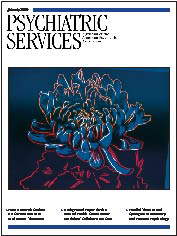Better Outcomes for Schizophrenia in Non-Western Countries
To the Editor: We read with interest the article in the November issue by Srinivasan and Tirupati (1) reporting on their study of cognition and work functioning among patients with schizophrenia in India. We were fascinated by their finding that 67 percent of the 88 patients in the study were employed and that most of them were in full-time employment in mainstream jobs with minimal or no disability or support in the workplace.
These findings will seem alien to most psychiatrists in the Western world, particularly in the United States. Schizophrenia in Western societies is conceptualized as a "chronic debilitating illness" with a poor prognosis and a poor functional outcome. However, this conventional wisdom is not entirely true. At least two major international studies, the International Pilot Study of Schizophrenia (2) and the Determinants of Outcome of Severe Mental Disorders (3), have provided convincing evidence for a better outcome in India and other "less developed" countries than in the West. The multisite study of factors affecting the course and outcomes of schizophrenia in India found that 64 percent of the participants were in remission at a two-year follow-up and only 11 percent continued to be ill (4). Such numbers are likely to be reversed in the United States.
The emphasis in Western psychiatry is on symptom control or elimination and rarely on functional recovery. Patients with schizophrenia also face severe stigma, which makes it difficult for them to find mainstream jobs and very often keeps them on the fringes of society. In addition, the general public strongly associates schizophrenia with violence. Some of the stigma has been propagated by psychiatrists and other mental health professionals. The characterization of schizophrenia as a biological "disease" that needs to be managed mostly by pharmacologic means may also contribute to poor prognosis.
It is also possible that in Western societies, expectation and beliefs about mental illness and the operation of the health care system serve to alienate patients with schizophrenia from normal roles in society and to prolong illness. In contrast, beliefs and practices in non-Western societies may encourage short-term illness and a quick return to premorbid status. Thus prognosis may also be the result of culturally based self-fulfilling prophecies (4).
It is obvious that although schizophrenia may have a biological basis, good outcomes depend on a pharmaco-psycho-social approach, and the psychosocial aspect may well have the greatest impact on improved outcomes.
Dr. Maju Mathews and Dr. Basil are affiliated with the department of psychiatry at Drexel University College of Medicine in Philadelphia. Dr. Manu Mathews is with the department of psychiatry at the Cleveland Clinic.
1. Srinivasan L, Tirupati S: Relationship between cognition and work functioning among patients with schizophrenia in an urban area of India. Psychiatric Services 56:1423–1428,2005Link, Google Scholar
2. World Health Organization: Schizophrenia: An International Follow-up Study. New York, Wiley, 1979Google Scholar
3. Sartorius N, Jablensky A, Korten A, et al: Early manifestations and first-contact incidence of schizophrenia in different cultures. Psychological Medicine 16:909–928,1986Crossref, Medline, Google Scholar
4. Verghese A, John JK, Rajkumar S, et al: Factors associated with the course and outcome of schizophrenia in India: results of a two-year multicentre follow-up study. British Journal of Psychiatry 154:499–503,1989Crossref, Medline, Google Scholar
5. Waxler NE: Is outcome for schizophrenia better in nonindustrial societies? The case of Sri Lanka. Journal of Nervous and Mental Disease 167:144–158,1979Crossref, Medline, Google Scholar



